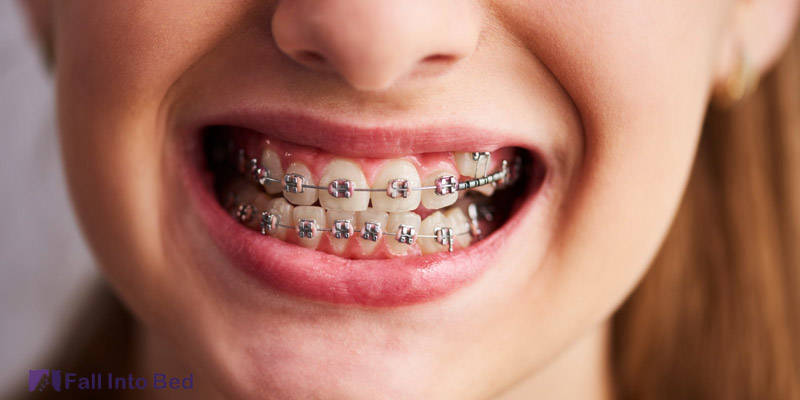Have you ever woken up in the middle of the night with an excruciating pain in your tongue? or perhaps you woke up with a sore tongue or painful jaw in the morning? If you’ve experienced these pains, it’s possible that you bite your tongue in sleep. This issue can have various reasons and causes. In this article, we are going to talk about the reasons behind biting tongue in sleep and give you some tips to solve this issue.
Why you’re biting your tongue at night?
Biting your tongue in sleep happens involuntarily, and it can have several reasons and causes. Let’s discuss the most common and important ones here:
Teeth Grinding (Bruxism)
Bruxism happens when a person doesn’t realize that they’re rubbing their upper and lower teeth and clench their jaw aggressively. This habit is extremely harmful to the teeth and jaw, and it can also damage the tongue if it gets caught in the middle of the teeth.
Waking up after night bruxism has some symptoms such as jaw pain, toothache, headache, ear pain or even bleeding tongue.
Stress and anxiety, sleep disorders like sleep apnea, and lifestyle factors can cause teeth griding.
Biting the tongue during sleep can be related to sleepwalking, as both may happen due to sleep disorders that disrupt normal sleep patterns. The same factors that cause sleepwalking might also trigger jaw clenching, leading to tongue biting. You can learn more about how to wake up a sleepwalker safely here.

Malocclusion
Malocclusion is when the upper and lower teeth are not aligned and causes the jaw to sit incorrectly. This misalignment can affect the way you bite, chew, and speak, and may also impact the overall appearance of your teeth and face.
This issue, can increase the risk of biting your tongue accidentally. Since the teeth don’t align properly, it can cause the jaw to close unevenly, making it more likely that the tongue gets caught between the teeth during unconscious movements.
Night seizure
Biting your tongue in sleep can be caused by nocturnal seizures which are seizures that occur during the night. This happens because the muscles in our body, including those that control the jaw, may contract uncontrollably during a seizure, leading to tongue biting. It can be a painful and sometimes serious issue, as it may cause injury to the tongue, bleeding, and soreness.
Other symptoms of this condition are:
- Unusual shaking during sleep
- Waking up with unexplained bruises, cuts, or other injuries, especially on the head, face, or limbs
- Urinating during sleep
- Waking up in the middle of the night without any apparent reason

Muscle spasm
Another reason why you might start biting your tongue in sleep is muscle spasm. Even though this mostly happens in children, you can see it at any age. Spasms in face and jaw muscles can result in tongue biting during sleep.
Rhythmic Movement Disorder
This condition usually happens in infant and children. In RMD, children bang their head or rick their bodies as they sleep. These movements can happen before sleep or during the early stages of sleep. Since they have no control over their bodies during this attack, they sometimes bite their tongue in the process.
Signs that you bite your tongue in sleep
Since this tongue biting happens during sleep, you don’t always notice it, unless it’s so bad that the pain wakes you up in the middle of the night.
There are some signs and symptoms you can check when you wake up, to know if you bite your tongue in sleep or not:
- Your tongue is swelling and red after waking up
- Your tongue is bleeding
- There are marks and glazes on your tongue
- You feel fatigued and exhausted

How to stop biting your tongue in sleep?
1. Use night guard
The first compensating method you can do, is using night guard. This way, you prevent further damage until you find out the root reason of the biting.
2. Stress Reduction Techniques
Sometimes, the biting or teeth griding happens due to stress and anxiety. Try using small techniques to reduce your daily stress like:
- Exercise every day
- Practice meditation
- Reduce sugar in your diet
- Talk to a mental health professional
3. Sleep analysis and testing
If the root of your tongue-biting problem is a sleep disorder, sleep analysis can help you find that out. Your medical specialist will take different tests like EEG to identify the problem and specify the solution.
Once you understand why your brain signals your jaw to clench or your face muscle to contract, you can get dedicated help.

4. See your doctor
It’s important to consult to your doctor and dentist about these tongue biting issue. If the problem is bruxism, malocclusion or any other teeth related condition, your dentist can help you with that.
Wrapping up our deep dive into the night-time mystery of tongue-biting, remember: while it might seem like a bizarre dream gone wrong, it’s actually your body’s way of saying, “Hey, something’s up!” Whether it’s stress, misaligned teeth, or just an overly adventurous dream.
So, sleep tight, and may your dreams be as peaceful as your tongue hopes for!😜








